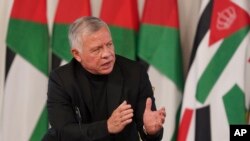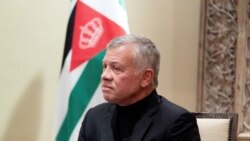Jordan’s King Abdullah’s office said Monday his ownership of properties in the United States and United Kingdom is “not unusual nor improper.”
The Royal Palace statement came a day after a group of journalists used millions of previously undisclosed documents to detail how current and former leaders throughout the world have amassed vast wealth and secret real estate holdings across the globe.
The investigation of nearly 12 million documents from 14 sources was led by the Washington-based International Consortium of Investigative Journalists, with 650 journalists from around the world working on the project.
The records showed that the Jordanian ruler spent $106 million on luxury homes along the Pacific Ocean in Malibu, California, Washington and other locations.
“These properties are not publicized out of security and privacy concerns, and not out of secrecy or an attempt to hide them, as these reports have claimed,” the Royal Palace said in its statement Monday.
The palace added that the king’s personal funds, and not state money, were used for the cost and related expenditures for the properties.
The documents, dubbed the Pandora Papers, exposed the offshore holdings of 35 current and former country leaders, including Russian President Vladimir Putin, former British Prime Minister Tony Blair, Kenyan President Uhuru Kenyatta and Czech Prime Minister Andrej Babis.
Czech leader Babis, facing an election later this week, used an offshore investment company to buy two villas in the south of France for more than $16 million, according to the records.
Babis denied any wrongdoing, saying Sunday during a televised debate on Prima News, “The money was sent out of a Czech bank, the money was taxed, it was my money and it returned back to the Czech Republic.”
The Washington Post, one of the news outlets that helped conduct the investigation, said the files included private emails, secret spreadsheets, clandestine contracts and other records that revealed financial schemes and who was behind them.
The documents showed that national leaders on five continents hid assets, often in other countries, with the investigation exposing more than twice as many offshore account holders as the Panama Papers, an examination five years ago by the investigative journalists of hidden financial assets at offshore entities across the world.
The new material comes from 29,000 offshore accounts at 14 separate financial-services companies operating in countries that include Switzerland, Singapore, Cyprus, Belize, the British Virgin Islands and elsewhere. Among the account owners, the Post said, are more than 130 people Forbes magazine lists as billionaires and more than 330 public officials in more than 90 countries and territories.
“Off-shore” refers to a time when remote island nations were the primary locales where people put money to shield it from government regulators, tax authorities, creditors, investigators and others.
“The offshore financial system is a problem that should concern every law-abiding person around the world,” Sherine Ebadi, a former Federal Bureau of Investigation officer who worked on dozens of financial-crimes cases, told the Post.
The records showed that a luxury waterfront apartment in Monaco is the residence of a Russian woman who reportedly had a child with Putin.
In recent years, U.S. presidents have imposed financial sanctions on oligarchs in Russia for what the U.S. Treasury has called malign activity. The Pandora Papers showed that those targeted have often made substantial efforts to evade the effects of the sanctions by shifting ownership of their assets. Nonetheless, the documents showed that the sanctions caused financial losses, including for Kremlin officials.
The documents, according to the British Broadcasting Corporation, said that Blair and his wife, Cherie, saved $421,000 in stamp duty when they bought a London office from an offshore company that owned the building.
The BBC said Azerbaijani President Ilham Aliyev, his family and close associates have secretly bought more than $540 million worth of property in Britain.
For years, international tax havens have been a favorite of the wealthy looking to hide assets. But the Post said the Pandora Papers showed that in recent years foreign, political and corporate officials have moved some holdings to even more secret American trust companies, including in the Midwestern state of South Dakota.
Chris Hannas contribute to this report. Some information came from the Associated Press and Reuters .







